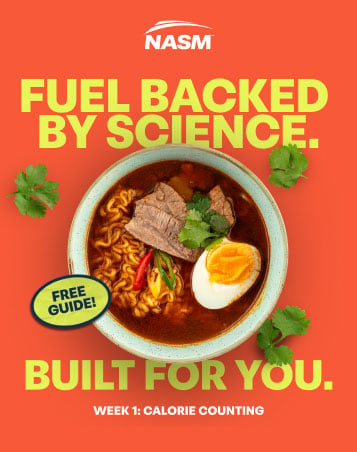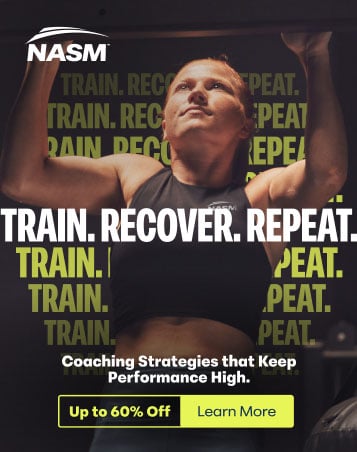Newton had it right all along: For every action, there is indeed a reaction. In 2021 this means that however hard we work towards our fitness goals, wellness goals, and professional goals, we must work that hard or harder towards recovery.I have spent the last 15 years of my career focused on the latest and greatest recovery techniques steeped in the latest and greatest physiological and psychological discoveries and technologies. Most, if not all, of these recovery strategies, have been adopted by pro athletes. There is indeed a best muscle recovery, a best brain recovery, and a best overall holistic recovery and most are relatively inexpensive.
Further, money does not have to drive quality recovery. Many recovery strategies simply require a foundational understanding of human biology and exploiting the natural recovery strategies we as humans have evolved to have.
Aspects of this subject - hydration, supplementation, and more - are explored even further within the NASM Sports Nutrition Program.
Sleep On It
The most effective recovery strategy that is free at our disposal is sleep. There is a bonafide biological explanation for why humans spend nearly one-third of our lives asleep. Sleep is multi-faceted and multi-functional. Sleep is divided into two critical types, and each is critically important for holistic recovery.
Non-rapid eye movement (NREM) sleep: NREM sleep is the original performance-enhancing "drug." Eighty-five percent of total sleep time consists of NREM sleep. The deepest stage of NREM sleep is also anabolic; meaning muscle, tissue, and energy building. NREM sleep is where energy reserves exhausted across the waking day are replenished, where muscle recovery is catalyzed, and where hormone-driven recovery ensues.
In the absence of sleep, there are indeed metabolic and physical consequences including but not limited to increased risk for skeletomuscular injury and inability to manage weight and maintain lean muscle mass. The level of metabolic consequences occurs not just at the level of muscle, but at the level of the brain; the brain loses its ability to fully utilize glucose but also resupply essential factors such as adenosine triphosphate (ATP).
One groundbreaking study of recovery in young, healthy males found that a single week of sleep restriction (< 60% of normal nightly sleep amounts across a week) reduced circulating testosterone levels by 50%. But even more shocking, the only way to rescue testosterone levels to baseline levels was through restoring nightly sleep amounts to the individual's "set point."
Rapid eye movement (REM) sleep: REM sleep is the state of sleep where dreaming takes place. Although REM sleep only makes up fifteen percent of total sleep time, REM sleep is what drives brain recovery. In the absence of REM sleep, there is a reduced ability to learn new information and regulate mood. Reaction time is also impacted.
Collectively, this means that workouts become more challenging physically and more challenging mentally because there is an inherent loss in effort, intensity, and motivation.
Drink Water Often
Another effective recovery strategy that is free at our disposal is hydration. Much like sleep, there is a bonafide biological explanation as to why a human will die after 2 -3 days without water.
Our bodies are composed of > 70% water. We lose a significant amount of fluids throughout the day just existing and breathing and even more while we are exercising.
Hydration is what stabilizes changes in body temperature when we exercise. Hydration is also what stabilizes the function of all organs of our bodies beyond just our kidneys and adrenals. Hydration is most important for stabilizing brain function. Thus, there is a reason why in the face of heat exhaustion, a loss of focus, attention, and ability to speak are three primary symptoms and why in the face of heat stroke, loss of consciousness is common.
Fortunately, there is an abundance of portable water stations in the workplace and public that allow us to always remain hydrated. The golden rule is 8 oz. every 30 - 60 min under temperate conditions (< 72 degrees Fahrenheit) and 12 oz. every 30 - 60 min in hot and humid conditions (> 85 degrees Fahrenheit and/or 70% humidity). Athletes must pay particular attention to hydration status. Dynamic changes in adrenal tone leading up to or during the stress of intense training and competition require more fluid balance within the body and lead to greater fluid loss.
Become Supple
Another effective recovery strategy that can be free but also cost-effective is stretching. In general, dynamic (movement-based) and static (position-based) stretching can help to minimize injury before exercising.
Dynamic and static stretching can also facilitate muscle recovery post-exercise. Full-body mobility and stretching such as many of the positions and movement flows adopted and practiced during yoga can also lead to increase mood and enhance cognitive performance.
Read also: Dynamic Stretching Demonstrated
The mechanism of action as to how mobility and stretching improve both physical and cognitive performance and accelerates both physical and cognitive recovery is simple: increased blood flow. Blood, as we know, carries many nutrients and essential biological factors to our organs, muscles, and brain, and the speed at which blood flows into these organs, muscles, and brain to expedite recovery can be accelerated through dynamic and static stretching.
One cost-effective strategy for further augmenting blood flow is the purchase of pneumatic compression sleeves. Pneumatic compression sleeves are a new-age recovery technology endorsed by pro athletes. Pneumatic compression sleeves made an inaugural appearance during the Tour de France over a decade ago, but nowadays, you can see many pro athletes utilizing them on the sidelines in between plays.
The technology is simple and ultimately increases blood flow into the muscles. While wearing pneumatic compression sleeves, a machine generates a series of rapid compressions immediately reducing blood flow around the major artery and venous supplies at an intensity and duration set by the user that is immediately proceeded by a series of rapid decompressions that ultimately augment overall blood flow into the muscles.
Pneumatic compression sleeves are > $1,000 but, for high-performing individuals are a recovery strategy of pro athletes that have been deemed a "game-changer."
Get Cold
A fourth effective recovery strategy that can be free but also cost-effective is cold immersion. Cold immersion has gained significant attention in recent years through the pioneering efforts of Wim Hof, a Dutch physiologist, and explorer.
Wim Hof has pushed the upper limits of utilizing both breath work and intermittent cold exposure such as waking up and taking an eight-minute cold shower to re-wire physiological processes to tolerate extreme cold. He is most famed for being able to trek snow-peaked mountains in nothing but a pair of briefs (and no shoes!).
For the everyday warrior though, cold immersion can improve muscle recovery and overall recovery. The mechanism of action is similar to that provided by mobility and stretching: overall augmentation of blood flow through rapid periods of reduced blood flow. A groundbreaking study has also found that cold immersion therapy can help to stabilize the immune system in fighting off infection8.
I have completed a longitudinal study of the benefits of cold immersion for recovery. This longitudinal study in which we found that cold immersion increases total nighttime sleep amounts even and overall sleep quality even when controlling for weekday versus weekend sleep amounts in a study of elite athletes. The mode of cold immersion was cryotherapy. Cryotherapy is a new-age recovery technique popular among pro athletes.
A cryotherapy session is three minutes in duration consisting of three minutes of exposure to very extreme temperatures. An athlete enters a cryogenic chamber and is exposed to nitrogen gas colder than - 270 degrees Fahrenheit and cools the skin temperature of the body to < 60 degrees Fahrenheit.
The physiological reaction is a survival response resulting in immediate shunting of blood to organs and muscles. Thus, after three minutes of cold exposure, overall blood flow is immediately augmented to naturally re-warm the body. This results in overall muscle recovery.
Supplement if Necessary
A last effective recovery strategy involves nutritional supplementation. The golden rule is that nutritional supplementation should come first and foremost through natural foods. Powders should never be the primary means of obtaining essential nutrients and minerals. But if daily life demands and challenges require additional supplementation, there are two effective options:
Creatine: Creatine is an essential source of energy produced by our cells. Creatine is necessary for all-out high-intensity exercise. Natural creatine reserves are depleted within a minute of high-intensity exercise. However, creatine is also the rate-limiting and backbone of providing cellular energy in general in the form of ATP.
ATP as discussed earlier drives waking performance and the rapid replenishment of ATP reserves is a natural biological recovery process. Creatine supplementation has been shown to sustain waking performance during the day and in some cases may facilitate better recovery sleep at night. In general, dosing is 10 g daily for two weeks ("loading" phase) followed by 5 g daily afterward for maintenance.
Magnesium: Magnesium is also an essential biological factor. Athletes and high-performers are also oftentimes magnesium-deficient due to daily work demands. Magnesium supplementation at night ranging from 250 - 350 mg has been shown to alter sleep architecture possibly promoting sleep consolidation and more recovery sleep. But again, always aim to get magnesium first through food before resorting to powder.
Conclusion
There is a wealth of recovery options out there. Recovery is far from being a one-size-fits-all. Depending on daily demands, needs, and even financial restrictions, there are options for everyone. Sleep and hydration should and always be your go-to's to stay optimal and enhancement should and can come in the form of mobility/stretching, cold immersion, and supplementation.
Key References
1. M. Schmidt, T. Swang, Hamilton, J. Best, State-dependent metabolic partitioning and energy conservation: A theoretical framework for understanding the function of sleep, PLoS One (2017) e0195746.
2. Freitas, L. L. D. S. N., da Silva, F. F. R., de Araújo Andrade, H. H., Guerreiro, R. R. C., Viegas, F. F., de Mello, M. M. T., & Silva, A. A. (2020). Sleep Debt Favor Skeletal Muscle Injuries In Athletes: A Promising Hypothesis. Medical Hypotheses, 109836.
3. K. Spiegel, R. Leproult, E. Colecchia, M. L'Hermite-Baleriaux, Z. Nie, G. Copinschi, et al., Adaptation of the 24-h growth hormone profile to a state of sleep debt, Am. J. Physiol. Reg. Integ. Compar. Physiol. 279 (3) (2000) R874 - R883.
4. K. Knutson, K. Spiegel, P. Penev, E. Van Cauter, The metabolomics consequences of sleep deprivation, Sleep Med. Rev. 11 (3) (2007) 163 - 178.
5. D. Plante, G. Trksak, E. Jensen, D. Penetar, C. Ravichandran, B. Riedner, et al., Gray matter-specific changes in brain bioenergetics after acute sleep deprivation: A 31P magnetic resonance spectroscopy study at 4 Tesla, Sleep, 37 (12) (2014) 1919 - 1927.
6. Leproult, R., & Van Cauter, E. (2011). Effect of 1 week of sleep restriction on testosterone levels in young healthy men. JAMA, 305(21), 2173-2174.
7. Scott, J. P., McNaughton, L. R., & Polman, R. C. (2006). Effects of sleep deprivation and exercise on cognitive, motor performance, and mood. Physiology & Behavior, 87(2), 396-408.
8. Kox, M., van Eijka,L.T., Zwaaga, J., Wildenberga, J., Sweepd, F., van der Hoevena, J.G., and Pickkersa, P (2014). Voluntary activation of the sympathetic nervous
system and attenuation of the innate immune response in humans. Proceedings of the National Academy of Sciences.
















